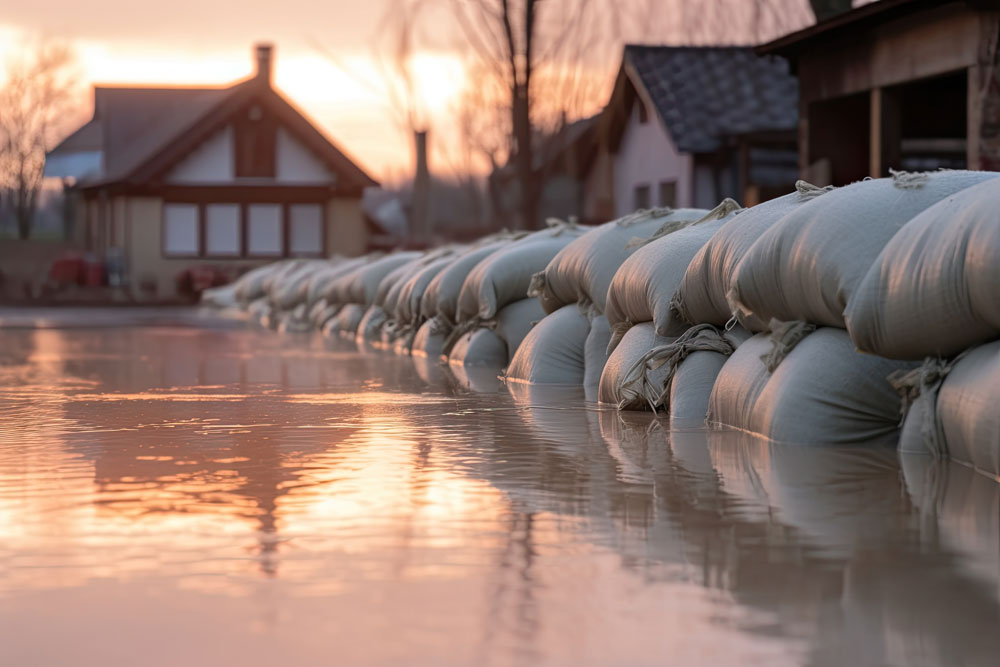How To Flood-proof A House

CONTENTS
- Is your home at risk of flooding?
- The different ways to flood-proof your home
- Flood resistance
- Flood resilience
- Get in touch
Flooding is become an increasingly common problem in the UK. If you live in an area that is at risk, it is crucial that you find ways to prevent water entering your home and minimise the damage a flood could cause.
At ICE Cleaning, we offer our flood damage cleaning services across the UK. Our accredited experts can quickly restore your property as close as to its previous state as possible and take care of the entire restoration process. We operate nationwide, 24 hours a day, 7 days a week.
Keep reading to find out how to protect your house from flooding.
Is your home at risk of flooding?
The UK’s winters are getting wetter and flash flooding events are more likely every year. With one in six properties at risk of flooding, it is worth checking if yours is at risk. You can find this out on the government website.
It is also recommended you sign up for flooding warnings so you can react to one quickly. Even if your property is not at risk, heavy rainfall could still cause flooding in your home so you should consider the following measures, too.
The different ways to flood-proof your home
There are two categories of measures to take to protect your home in the event of flooding. There is flood resistance which consists of ways to stop water entering your home, and flood resilience which prevents and minimises damage to your property.
Flood resistance
Create a barrier against floodwater with sandbags
Use them to block doorways, drains, and openings in your home that could let in water. Your local council might have a stockpile for you to use or you can buy them from building supply shops. They are a cheap and easy to find flood defence, but they do not provide a water-tight seal.
Install air brick covers
These low-cost covers stop water entering your home through air bricks. Make sure you remove them after flooding so the bricks can dry out. Self-closing air bricks can also prevent water coming into your home as they automatically shut off during floods.
Have non-return valves on drains and pipes installed
During floods, lots of water can enter the sewage system, forcing the sewage flow back up through your toilets and sinks. This can make the situation far more dangerous due to the number of pathogens in sewage.
Raise door thresh​old
It may be an expensive change to make, but it is an effective way to prevent water coming in through your doorway. You can also install flood gates on doors and windows to form an air-tight barrier against flooding.
Purchase a sump pump
Sump pumps can quickly drain water in your home and pump it away from the property. This is especially useful if your basement is prone to flooding as it can automatically detect rising water levels or pressure.
Have your garden landscaped
Your garden and patio can help divert water away from your home. The ground should slope away from your home so water does not flow towards it. You should also add gravel to your patio in between the pavers as it can stop water pooling or consider permeable paving surfaces.
Flood resilience
Mount high shelves for valuable items
You should also keep possessions on lower shelves in baskets so you can easily and quickly move them elsewhere in the event of a flood.
Keep expensive goods like TVs off the ground by making sure they are on the higher floors of your property, as well. If they are kept on the ground floor, place them on plinths so they are out of reach of floodwater.
Move plug sockets up the wall
Raising them by 1.5m significantly reduces the chances that they will be damaged by flooding. It is also recommended you raise fuse boxes, controls, and wiring, too.
Replace wooden flooring and carpets
When flooded, wood can warp, leading to permanent damage. Ceramic tiles are a good alternative as they can easily be cleaned and dried after flooding.
Carpets are also very difficult to dry out after they get soaked which can result in a very serious mould problem. Instead, place rugs around your home.
Consider plastic skirting boards
Wooden skirting boards can absorb water and sustain damage. Plastic ones simply need to be wiped down after flooding. You can also varnish wooden ones to protect them against floodwater.
Get in touch
Our technicians can remove all the water from your home, and dry out and deep clean it. We also offer a range of other services in conjunction with flood damage cleaning including mould remediation and damp odour removal. They can be on site within several hours in an emergency.
To find out more about our flood restoration services, contact our team on 0208 066 0360 or send them an email at enquiries@icecleaning.co.uk.

Speak with me today,
I’m here to help
By asking you a few questions either via phone or email I can immediately provide a realistic estimation of the cost.
You’re in good company. We’ve cleaned for the following commercial clients… View all

Why choose us?
- Cater to a wide variety of cleaning situations
- Nationwide coverage, available 24/7
- Cater to commercial and domestic clients
- Free survey provided prior to quotation
- Emergency response team
- Offer a bespoke service designed to suit all your needs
- All technicians hold professional health and safety qualifications, including BICSc, IOSH, Dewpoint Professional & Safe Contractor
We’re fully accredited
We place best practise, professional expertise and health and safety at the core of our business. We’re fully compliant with all legal obligations. You can view a list of our accreditations below, or visit our Health & Safety page for more information.











-RGB-small.1707319151.jpg)




















